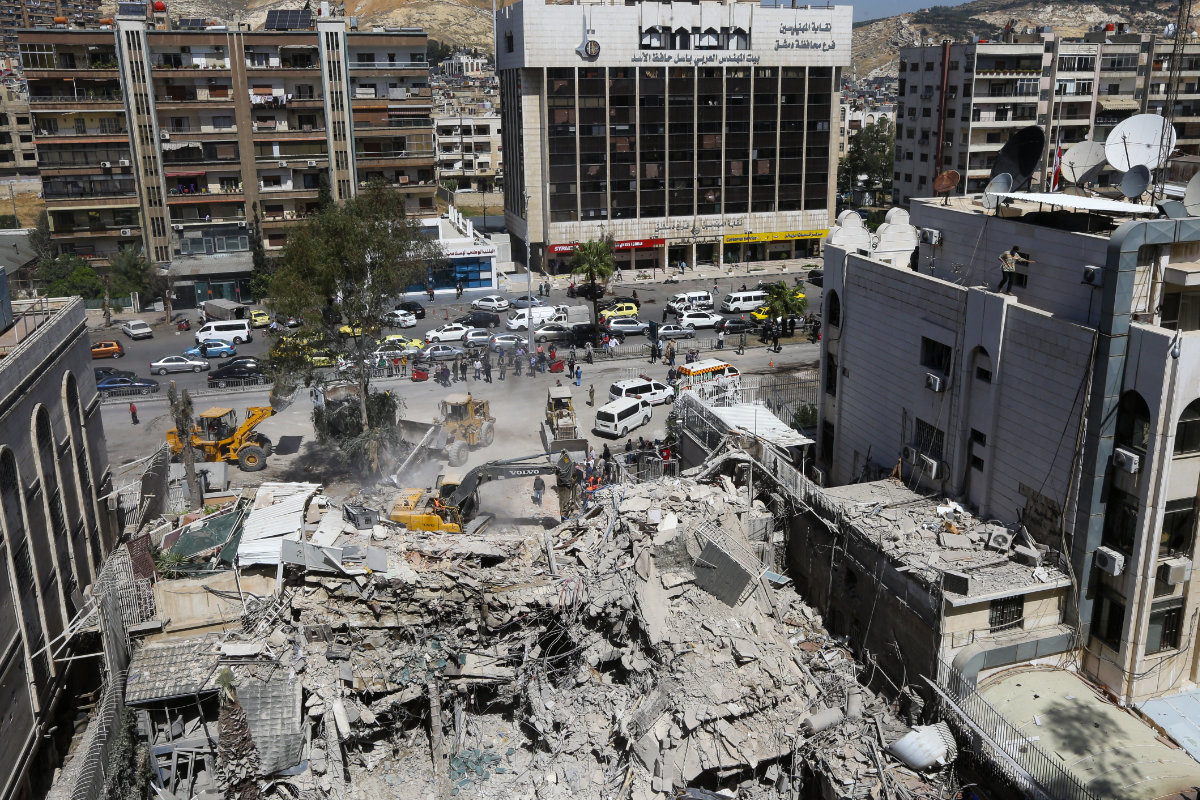MOSCOW: Russia, Germany and Britain on Thursday urged countries in the Middle East to show restraint and Israel said it was preparing to “meet all its security needs” in a region on edge over an Iranian threat to strike Israel.
The German airline Lufthansa, one of only two Western carriers flying to Tehran, extended a suspension of its flights to the Iranian capital and Russia warned against travel to the Middle East.
Iran has vowed revenge for the April 1 airstrike on its embassy compound in Damascus that killed a top Iranian general and six other Iranian military officers, ratcheting up tension in a region already strained by the Gaza war.
Israel has not claimed responsibility for the attack, but Iranian Supreme Leader Ayatollah Ali Khamenei said on Wednesday Israel “must be punished and it shall be,” saying it was tantamount to an attack on Iranian soil.
The “imperative for Iran to punish this rogue regime” might have been avoided had the UN Security Council condemned the strike and brought the perpetrators to justice, Tehran’s mission to the United Nations said on Thursday.
Prime Minister Benjamin Netanyahu said Israel was keeping up its war in Gaza but making security preparations elsewhere.
“Whoever harms us, we will harm them. We are prepared to meet all of the security needs of the State of Israel, both defensively and offensively,” he said in comments released following a visit to an air force base.

A view of the consular annex of Iran's embassy in Damascus, Syria, that was demolished by an Israeli airstrike on April 1, 2024, killing at least 13 people, including two Iranian Revolutionary Guards generals and five personnel from the force. (AP)
Iran has signalled to Washington that it will respond to Israel’s attack in a way that aims to avoid major escalation and it will not act hastily, Iranian sources said.
Israeli Defense Minister Yoav Gallant told US Secretary of Defense Lloyd Austin that Israel would respond directly to any attack by Iran, Gallant’s office said.
Conflict has spread across the Middle East since the eruption of the Gaza war, with Iran-backed groups declaring support for the Palestinians waging attacks from Lebanon, Yemen and Iraq. Tehran has avoided direct confrontation with Israel or the United States, while declaring support for its allies.
German Foreign Minister Annalena Baerbock called on her Iranian counterpart Hossein Amirabdollahian to urge “maximum restraint” to avoid further escalation.
Russia’s foreign ministry told citizens they should not travel to the Middle East, especially to Israel, Lebanon and the Palestinian territories.
“Right now it’s very important for everyone to maintain restraint so as not to lead to a complete destabilization of the situation in the region, which doesn’t exactly shine with stability and predictability,” Kremlin spokesman Dmitry Peskov told a news briefing.
‘Potential for miscalculation’
British foreign minister David Cameron said on Thursday he had made clear to Amirabdollahian that Iran should not draw the Middle East into a wider conflict.
“I am deeply concerned about the potential for miscalculation leading to further violence,” Cameron said on X.
US State Department spokesperson Matthew Miller said Secretary of State Antony Blinken called counterparts including the Turkish, Chinese and Saudi foreign ministers “to make clear that escalation is not in anyone’s interest and that countries should urge Iran not to escalate.”
US President Joe Biden said on Wednesday Iran was threatening to launch a “significant attack in Israel,” and that he had told Netanyahu that “our commitment to Israel security against these threats from Iran and its proxies is iron-clad.”
The US expects an attack by Iran against Israel but one that would not be big enough to draw Washington into war, a US official said late on Thursday.
Iran is the third-largest oil producer in the OPEC group and oil prices stayed near six-month highs on Thursday.
Late on Wednesday, an Iranian news agency published an Arabic report on the X platform saying the air space over Tehran had been closed for military drills, but then removed the report and denied it had issued such news.
Lufthansa said it would probably not fly to Tehran before April 13. Austrian Airlines said it was still planning to fly on Thursday but was adjusting timings to avoid crew having to disembark for an overnight layover.
Iranian air space is also a key overflight route for Emirates’ and Qatar Airways’ flights to Europe and North America.
Emirates, Qatar Airways, Turkish Airlines, Aeroflot and Air Arabia, among the airlines that fly to Tehran, did not immediately respond to requests for comment.




























